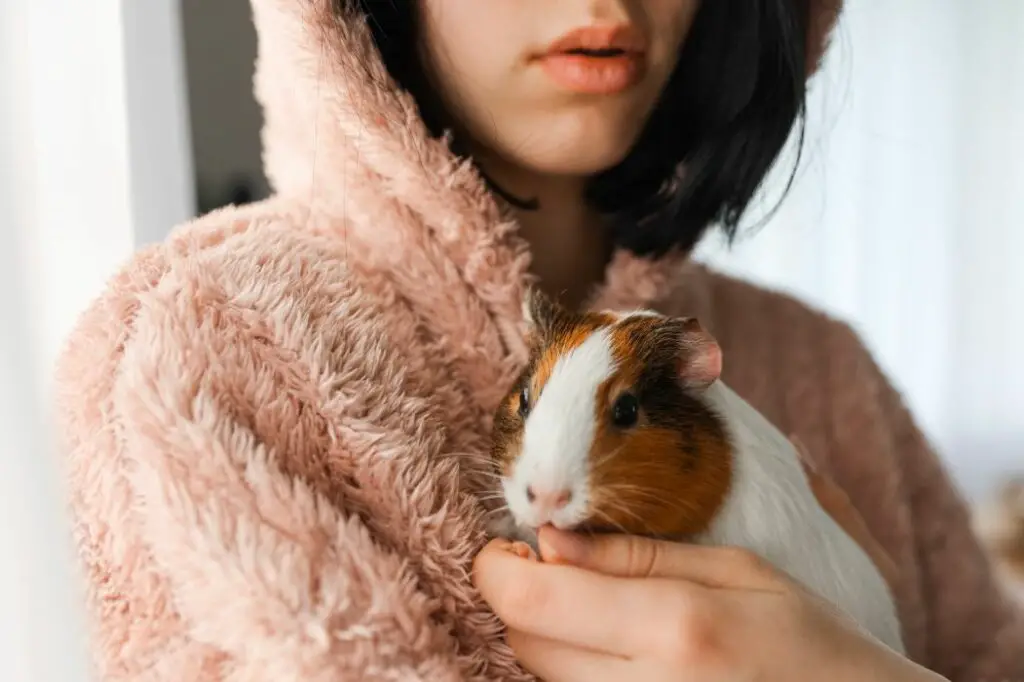One of the most common questions I get asked about guinea pigs is why they vibrate and purr. These behaviors can be confusing for new guinea pig owners, but they are actually quite common and can be a sign of good health and happiness.
In this blog post, we will explore the physiology of guinea pigs, the significance of vibrating and purring in their behavior, techniques for bonding with your guinea pig, and the health benefits of these behaviors.

The Physiology of Guinea Pigs
Understanding the anatomy of guinea pigs is key to understanding their behaviors. Guinea pigs have long, sensitive whiskers called vibrissae which are located on their face.
Vibrissae are highly sensitive and help guinea pigs to navigate their surroundings, avoid predators, and communicate with other guinea pigs. Guinea pigs also have strong facial muscles, which they use to communicate with each other through various facial expressions.
Purring is related to guinea pig socialization. When guinea pigs are happy and content, they will often purr as a way of communicating with other guinea pigs. Purring is a low-frequency sound that can be heard when a guinea pig is relaxed and content. It is similar to the way that cats purr when they are happy.
The Significance of Vibrating and Purring in Guinea Pig Behavior
Guinea pigs use vibrating and purring as a way of communicating with each other. Vibrating is a behavior that guinea pigs use to show dominance or submission. When a guinea pig vibrates, they are essentially saying “I am in charge” or “I am submitting to your authority.”
Vibrating can be accompanied by other behaviors such as teeth chattering or rumble strutting. These behaviors are all ways that guinea pigs communicate with each other and establish their social hierarchy.
Purring, on the other hand, is a sign of contentment and happiness. When a guinea pig is happy and relaxed, they will often purr as a way of communicating with their human companions. Purring can also be a sign of good health, as sick or stressed guinea pigs are less likely to purr.
Bonding with Your Guinea Pig Through Vibrating and Purring
Bonding with your guinea pig is an important part of building a strong relationship with them. One way to bond with your guinea pig is through petting and cuddling.
When you pet your guinea pig, pay attention to their body language and behaviors. If they are relaxed and purring, this is a good sign that they are happy and comfortable with you. If they are vibrating, this may be a sign that they are feeling stressed or uncomfortable.
It is also important to create a comfortable and safe environment for your guinea pig. This includes providing them with plenty of space to run around, a comfortable place to sleep, and plenty of fresh water and hay. Regular veterinary checkups are also important for ensuring that your guinea pig stays healthy and happy.
The Health Benefits of Vibrating and Purring in Guinea Pigs
Vibrating and purring can have a positive impact on both guinea pigs and their human companions. When guinea pigs are happy and content, they are less likely to develop health problems such as obesity or dental issues. Purring can also have a calming effect on humans, helping to reduce stress and anxiety.
Regular veterinary checkups are important for ensuring that your guinea pig stays healthy and happy. During these checkups, your veterinarian will examine your guinea pig’s teeth, ears, and eyes, and check for any signs of illness or disease.
Conclusion
Guinea pigs are fascinating animals with complex behaviors and communication patterns. By understanding the physiology of guinea pigs and the significance of vibrating and purring in their behavior, you can bond with your guinea pig and provide them with a comfortable and safe environment. Regular veterinary checkups are also important for ensuring that your guinea pig stays healthy and happy. If you have any questions or concerns about your guinea pig’s behavior, don’t hesitate to speak to your veterinarian.
- How Long Do American Eskimo Dogs Live? Important Factors and Care Tips - September 29, 2023
- Do American Bulldogs Need Grooming? Essential Tips and Care Guidelines - September 29, 2023
- Do Bengal Cats Enjoy Playing? Essential Tips for Keeping Them Active - September 29, 2023